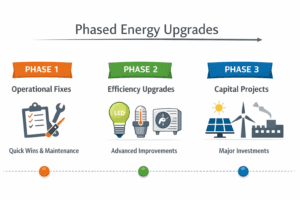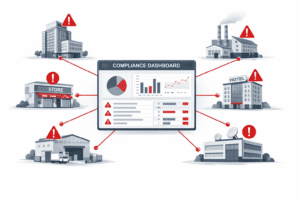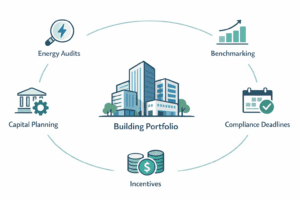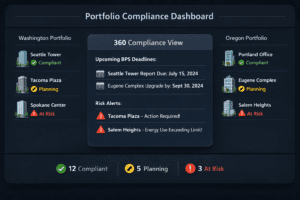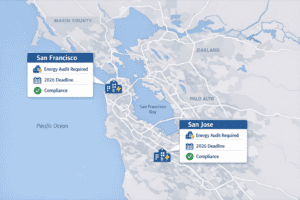I. Introduction
Brief Overview of the Blog
This comprehensive blog aims to unravel the complex tapestry of benchmarking laws across different states in the U.S., focusing on energy efficiency. As each state has unique regulations and standards, understanding these can significantly impact how businesses and consumers approach energy usage and conservation.
Importance of Understanding Energy Efficiency Regulations on a State-by-State Level
Navigating through the myriad of state-specific energy regulations is crucial for ensuring compliance, optimizing operational efficiency, and minimizing environmental impacts. For stakeholders, a deep understanding of these laws aids in better planning and implementation of energy conservation programs and can foster enhanced economic benefits through energy savings.
II. What is Energy Efficiency and Why Does it Matter?
Explanation of Energy Efficiency
At its core, energy efficiency involves using less energy to perform the same job. This not only cuts energy costs but also reduces the demand for energy production, thus lessening the strain on the environment. Technologies and strategies that improve energy efficiency are now more crucial than ever, as they directly contribute to lowering the overall energy consumption of a community, state, or country.
The Role of Energy Efficiency in Mitigating Climate Change
Energy production and consumption are major sources of greenhouse gas emissions, which contribute to global warming and climate change. By improving energy efficiency, we can decrease the amount of fossil fuels burned, thereby reducing pollution and conserving natural resources. This shift is essential for creating a sustainable future and mitigating the impacts of climate change.
Benefits of Energy Efficiency for Consumers and Businesses
For consumers, energy efficiency translates into reduced utility bills and less money spent on energy. For businesses, it means lower operational costs and potentially a smaller carbon footprint, which is not only good for the planet but also enhances the company’s market image. Moreover, implementing energy efficient appliances and systems can lead to increased property values and improved indoor air quality.
III. Overview of United States Energy Efficiency Regulations
Brief Explanation of Federal Energy Efficiency Laws
The United States upholds various federal regulations designed to foster energy efficiency across multiple sectors. These include Energy Star programs, mandatory building energy codes, and standards for industrial operations. For more information, the U.S. Department of Energy website offers a gateway to understanding federal initiatives (U.S. DOE).
The Impact of These Regulations on States
Federal energy regulations often set the baseline standards that states can choose to adopt or surpass. This dynamic creates a varied landscape of energy policies across the country, where some states like California and New York take more stringent approaches, while others may stick closer to the federal guidelines.
IV. Energy Efficiency Laws: A State-by-State Guide
California
– Overview of the State’s Energy Efficiency Regulations: California is at the forefront of environmental regulation, boasting some of the toughest benchmarking laws in the country.
– Specific Energy Laws and Standards: The state mandates regulations on a vast array of appliances and has implemented rigorous standards that exceed federal requirements.
– State-Specific Energy Efficiency Programs or Initiatives: Programs such as CalGreen and the California Solar Initiative highlight the state’s push towards renewable energy and energy-efficient building designs. More details can be found on California’s Energy Commission website (California Energy Commission).
Texas
– Overview: With its large energy consumption and production, Texas’ energy policies are vital for its own sustainability goals.
– Specific Laws and Standards: Texas has robust programs focusing on industrial and residential energy efficiency.
– Initiatives: The Texas Energy Star program promotes high standards for building and appliance efficiency across the state.
New York
– Overview: New York advocates for aggressive energy efficiency measures, aiming to reduce its energy consumption significantly by 2030.
– Laws and Standards: It has stringent building energy codes and high standards for energy-efficient appliances.
– Programs: The state’s NY-Sun initiative is an ambitious renewable energy program intended to increase the use of solar power in residential, commercial, and community projects.
V. Role of Renewable Energy and Green Building Regulations
Connection Between Energy Efficiency and Renewable Energy
Integrating energy efficiency with renewable energy sources is a synergistic approach that reduces overall energy use while shifting the balance towards more sustainable energy sources like wind, solar, and hydroelectric power.
State Laws Governing Renewable Energy Sources
Legislation across various states supports the expansion of renewable energy through incentives for solar power installations, wind farms, and more. These laws not only promote the adoption of renewable technologies but also ensure that the infrastructures built are sustainable and efficient.
Overview of Green Building Regulations
Green building regulations vary significantly across states, but they generally include measures that encourage the use of sustainable materials, improve energy and water efficiencies, and reduce waste and pollution. LEED certification is a well-recognized standard in this area (LEED).
VII. Compliance with Energy Efficiency Regulations
Breakdown of Energy Star Compliance and Other Energy Rating Systems
Adhering to ENERGY STAR standards is essential for ensuring that appliances and building practices meet specific efficiency criteria, which can significantly reduce energy consumption and utility costs.
The Importance of Energy Audits for Compliance
Regular energy audits can help businesses and homeowners identify areas where energy is being wasted and where improvements can be made. These audits are critical for staying compliant with local energy compliance regulations and for making cost-effective upgrades.
VIII. Conclusion
Recap of the Importance and Benefits of Energy Efficiency Laws
State-specific energy efficiency laws are designed not only to mitigate environmental impact but also to provide economic advantages through reduced energy costs and increased sustainability.
Encourage Businesses and Consumers to Adhere to These Regulations for a More Sustainable Future
Understanding and adhering to these diverse regulations is crucial for fostering a sustainable, economically viable energy future. It benefits everyone—from individual consumers to large corporations—to stay informed and compliant.
Final Thoughts or Call to Action
As we move forward, embracing and advocating for stringent energy efficiency measures and sustainable energy practices will prove essential in steering our society towards a more sustainable and environmentally friendly future. Consider conducting an energy audit or upgrading to ENERGY STAR-certified appliances to start making a difference in your energy consumption today.
VertPro.com serves as a resourceful platform for property owners and managers seeking to enhance their buildings’ energy efficiency. The site offers a range of services, including Commercial Energy Audits, Benchmark Compliance consultancy, and a Construction Marketplace. At the heart of VertPro® is a suite of SaaS technology-based solutions designed to assist in navigating the complexities of Energy Benchmarking and Energy Audits/RCx Plus, while ensuring adherence to over 60 Energy Benchmarking and Energy Efficiency Laws across the country.
For those looking to improve their property’s energy usage and operational value, VertPro.com provides a diverse array of tools and information. The site aims to facilitate a better understanding of energy efficiency practices and legislation, helping building owners and property managers make informed decisions about their energy strategies while complying with all energy ordinances and laws.





